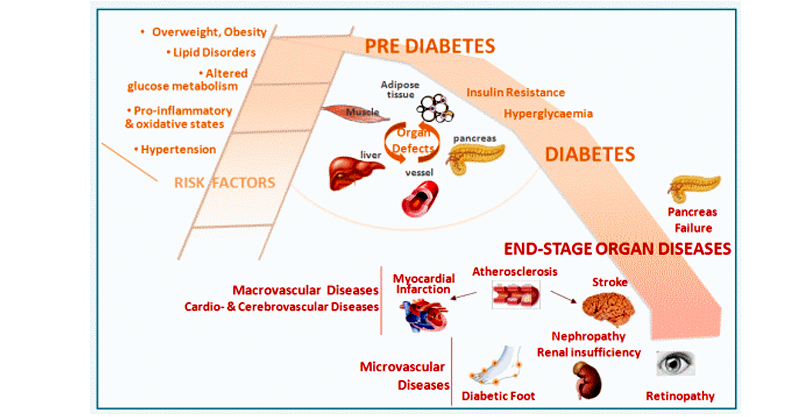![]()
According to the American Diabetes Association 23.6 million Americans (7.8% of the population) have diabetes and another 57 million people (18.8%) have insulin-resistant pre-diabetes. The vast majority of diabetes is the type II variety known as degenerative diabetes.
The fasting blood sugar test is done after an overnight fast or an 8 hour fast during the day. Diabetes is defined as having a fasting blood sugar of 126 mg/dl or higher. Pre-diabetes is defined as having a fasting blood sugar between 100-125 mg/dl. The Pre-Diabetic Condition is considered the #1 most non-diagnosed, serious health condition in the western world.
Advanced Glycoltic Enzyme Development
When we consume sugar or starch it turns into glucose. The pancreas produces and releases insulin in response to the elevation of blood sugar. It is vitally important for insulin to get sugar out of the blood stream and into the cells effectively. Elevated blood sugar is toxic to the body as it combines to protein molecules and creates Advanced Glycolytic Enzymes (AGE’s).
These AGE’s are highly inflammatory and destructive as they damage tissue throughout the body including nerve fibers and blood vessels. This is the reason for the neurological and cardiovascular complications involved with diabetes.
Testing AGE Levels
One way to test advanced glycolytic enzyme levels is through a hemoglobin A1C (HgA1C) test. This test looks at the amount of red blood cell protein (hemoglobin) that is glycated with sugar. Since red blood cells have an expected lifespan of 120 days this test looks at your blood sugar metabolism over the previous 120 day period.
High HgA1C levels are an indication of elevated AGE levels throughout the entire body. This indiciates accelerated aging processes and metabolic disease.
Pre-Diabetes is where there is an imbalance between glucose and insulin. The cells are developing a level of insulin resistance and the pancreas may be overburdened and unable to produce enough insulin after a meal to clear-out the glucose within the blood. Pre-diabetics are at a 50% higher risk of heart disease and stroke than one without pre-diabetes.
Both diabetes and prediabetes are a result of chronic inflammation. When testing for these disorders it is especially important to look at inflammatory compounds such as C-Reactive protein (CRP-hs) and Homocysteine.
Where Doctors Go Wrong
Most doctors simply test blood sugar and may test your hemoglobin A1C and fail to test for hormonal function and inflammatory compounds. The fasting glucose test gives them the information they need to make a diagnosis and give lifestyle advice and treat with a diabetes medication.
However, these two tests alone do not give us enough information of the primary factors in the inflammatory process. For example, elevated homocysteine lets us know that we are failing to consume or process B vitamins correctly. Without testing this, the individual may never get to the cause of their inflammation and continue to get worse.
Another example would be having low levels of vitamin D3. This creates elevated inflammation and is an important factor in the development of auto-immune conditions that have been found to be associated with the development of diabetes.
One could make necessary lifestyle changes and begin exercising and following a healthy diet and never address their D3 levels. In this case, the individual may believe the lie that they need medication to address this condition. So if you are only testing fasting blood glucose you are certainty benefiting those who sell diabetic test strips but you aren’t looking at the whole picture of what is happening in your body.
The ideal diabetes panel should analyze fasting blood sugar, insulin levels, HgA1C, leptin levels, homocysteine, high sensitivity C Reactive protein levels and vitamin D3 levels. A functional medicine doctor or health coach trained in functional diagnostics can order the appropriate tests and help figure out the appropriate natural lifestyle plan.
The Complete Diabetes Panel
This test has all the key elements to get the full view of what is happening in the body with blood sugar metabolism. It allows us to understand the dynamics of your unique case so that a specialized plan can be outlined to help you overcome your metabolic challenges.
This test looks specifically at the following:
Hemoglobin A1C: The A1C test result reflects your average blood sugar level for the past two to three months. Specifically, the A1C test measures what percentage of your hemoglobin — a protein in red blood cells that carries oxygen — is coated with sugar (glycated). The higher your A1C level, the poorer your blood sugar control and the higher your risk of diabetes complications.
Insulin: This is the major hormone responsible for blood sugar metabolism and it acts as a storage hormone in the body. Elevated insulin levels are associated with insulin resistance and chronic inflammation. Extremely low insulin levels can be a sign the pancreas is no longer producing this hormone.
Leptin: This is a major hormone secreted by the fat cells and it interacts with the hypothalamus of the brain. It is considered our satiety hormone and when the body is appropriately sensitive to leptin we feel satisfied and burn fat as fuel. Leptin insensitivity leads to cravings, overeating and weight loss resistance among other problems.
Homocysteine: An inflammatory compound that is greatly associated with heart disease, diabetes and neurodengerative conditions. Low levels indicate issues with methylation and B vitamin deficiencies.
C Reactive Protein: C Reactive Protein (CRP) is one of the major inflammatory markers that should be measured when assessing inflammatory levels and risk of diabetes and heart disease. Studies have indicated that individuals with elevated levels of CRP have a risk about 2-3 times higher than the risk of those with low levels. This is a high sensitivity test that is the best on the market and is called CRP-hs.
Vitamin D3 Levels: This pro-hormone is extremely critical for healthy blood sugar balance and immune function. Low vitamin D3 levels are associated with altered immune states and chronic inflammation. There is a significant associated between low D3 levels and the development of type II diabetes.
 Benefits Of Getting This Test
Benefits Of Getting This Test
Figure out what your hormones and metabolic function looks like and discover how your inflammatory pathways may be damaging your body. This test will give your functional medicine doctor the information they need to accurately assess and appropriately treat your condition in order to help your body heal naturally.

Total Cost: $225.00

Fortunately, because of the many thousands of newsletter readers and social media followers, my team has been able to network with a great lab distributor and get the best possible pricing for everyone.
The retail value (using market value and insurance based rates) is highly inflated and driving up the cost of health care. This is the old, archaic method that many people are still using and paying way more for insurance and co-pays than they really should be.
Many intelligent people are saving insurance premium dollars and turning to pay by order labs such as DirectLabs and others. These skip the middle man (doctors’ visits) and cut down costs for the patient.

My team has been able to beat all of these other methods when it comes to providing the best educational descriptions behind the tests and superior savings. By using DrJockers.com as your source you will save time and money and know exactly the right tests for you so you can get well quicker with less cost.
Additionally, when you order special labs from DrJockers.com you will receive a free email with a summary of your results and lifestyle and supplement recommendations from Dr Jockers himself or a well-qualified team member.

If the test requires blood work you can take your kit to any local lab and have the trained professional take your blood and fill out the kit and send it in the mail.
Urine and blood prick tests can all be done in the comfort of your home and sent into the lab with the mailing slip in your kit. All instructions will be sent to you with the kit. It is a very simple process that most anyone can figure out. The lab also has a customer service phone # if any help is needed.






